
 Flash News
Flash News
Ceno Klosi with over 800 stolen votes, Balluku finds the reason is the tiredness of the counters
"Fast & Furious" in the former Block, police chase an Audi Q8, 4 cars collide
Car hits two tourists on a motorcycle in Fushe Arrëz, one of them dies
Serious accident in Thumanë, one dead, 3 injured
Durrës Court suspends the director of Pre-University Education from duty

By Lutfi Dervishi
The Constitutional Court of North Macedonia is at a historical crossroads. The expected decision on the status of the Albanian language has an importance that goes beyond the legal framework, as it affects historical and national identity, cultural survival, and the very nature of the foundations of the state.
The history of the Albanian language is a story of challenge and resistance. Its survival is a testament to a people who refused the assimilation that swept across much of the continent. While other languages in the Latin-speaking part of the Roman Empire (Portugal, Spain or France) were Romanized, the Albanians fanatically preserved their language.
For more than two millennia, Albanian survived in the face of waves of great imperial languages, from Roman Latin to Greek and Church Slavonic, from Ottoman Turkish to Arabic.
The importance of the Albanian language goes beyond its communicative function. Albanian is the bearer of a unique cultural and historical identity. Not in vain, the poet Pashko Vasa proclaimed the motto that is second to none on the planet: “The religion of the Albanian is Albanianism.” This statement declares that: the Albanian identity, embodied by the language, transcends religion, politics and external pressures/threats.
This motto was best expressed at the Congress of Manastir in 1908. Albanian intellectuals and patriots gathered in Manastir to standardize the alphabet of the Albanian language, ultimately choosing the Latin alphabet.
This bold decision, made under Ottoman rule and in the face of fierce debate and opposition, symbolized a break with the past and a step towards a Western future. Albanians became the first Muslim-majority nation in the world to embrace the Latin alphabet. This decision made in Manastir not only unified the language, but also marked the West as the North Star of Albanians.
In the context of North Macedonia, the Albanian language is not just a language spoken by at least ⅓ of the population; the Albanian language is a constitutional pillar. The 2001 Ohrid Agreement recognized Albanians as a constituent nation of the state. This agreement not only ended years of discrimination, but also sanctioned the principle of linguistic and identity equality.
To call into question the status of the Albanian language today with legal artifice is to call into question the very foundation of North Macedonia as a multiethnic state. The argument that the state belongs equally to Macedonians and Albanians is not only political, it is as historical as it is moral.
The Constitutional Court's decision on the Albanian language is not simply a legal issue; it is a testament to the country's commitment to equality and unity. Albanians have suffered enough, fought long, and shed blood to preserve their language, even in the face of seemingly insurmountable challenges.
The historical narrative is clear: Albanians have survived empires, foreign rule, and religious conversions, but they have never abandoned their language. From the recognition of its ancient roots to the historic decision of the Congress of Manastir, the Albanian language has remained the common denominator of all Albanians regardless of religious affiliation.
The judges of the Constitutional Court now face a simple choice. They can either honor this history by confirming the equal status of the Albanian language, thereby strengthening the foundations of a multiethnic state; or they can turn back the clock, reviving old tensions and undermining not only the progress achieved since the Ohrid Agreement, but perhaps the very existence of the state.
North Macedonia, our eastern neighbor, has suffered for decades and is still suffering, on its path to the EU due to disagreements with its neighbors: with the Greeks 30 years of deadlock over the name and now with the Bulgarians (among other things) over language issues. (On the long and tiring journey to the EU, the Macedonians have no better allies than the Albanians, but they should not mistake kindness for weakness.)
As history has taught us, languages are more than words; they are circulating vessels of identity. And the history of the Albanian language is one of the most extraordinary stories of survival in human history.
It is a history that North Macedonia should not fear, but rather embrace, certainly if it wants to build a future based on equality and mutual respect.
Those who do not learn from history risk repeating its mistakes.
Latest news





Lufta në Gaza/ Pse Netanyahu do vetëm një armëpushim 60-ditor, jo të përhershëm?
2025-07-02 21:56:08
US suspends some military aid to Ukraine
2025-07-02 21:40:55



Methadone shortage, users return to heroin: We steal to buy it
2025-07-02 20:57:35
Government enters oil market, Rama: New price for consumers
2025-07-02 20:43:30
WHO calls for 50% price hike for tobacco, alcohol and sugary drinks
2025-07-02 20:41:53







Israel agrees to 60-day ceasefire in Gaza, but many unanswered questions remain
2025-07-02 18:35:27
The weather in Germany is going "crazy", temperatures reach 40°C
2025-07-02 18:22:21

"Fast & Furious" in the former Block, police chase an Audi Q8, 4 cars collide
2025-07-02 17:59:25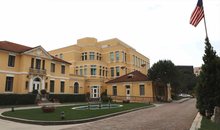
"Birth on a tourist visa? US Embassy warns Albanians: This is prohibited!"
2025-07-02 17:48:16


BIRN: Fier recount reveals vote trafficking within open political party lists
2025-07-02 16:57:19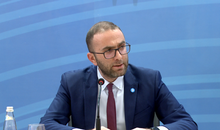

CEO and former director of 'Bankers Petroleum' arrested in Fier
2025-07-02 16:40:42
Car hits two tourists on a motorcycle in Fushe Arrëz, one of them dies
2025-07-02 16:33:23



Fire at the Elbasan Incinerator Landfill, Prosecution Launches Investigations
2025-07-02 15:34:54
What you need to know if you travel to a country with active volcanoes
2025-07-02 15:33:03



EU proposes 90% reduction in greenhouse gases by 2040
2025-07-02 14:50:23
Europe is burning from the heat / Italy and France are on maximum alert
2025-07-02 14:36:52

Moscow's contradictory statements: Is the friendship with Vučić breaking down?
2025-07-02 14:21:05
'I lost my battle': Sea warming is killing fishing in Albania
2025-07-02 14:08:35
Sekretet kimike që ndihmojnë në mbajtjen e mjaltit të freskët për kaq gjatë
2025-07-02 14:01:26
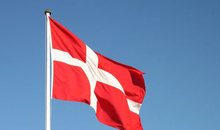
Denmark makes historic decision to make military service mandatory for women
2025-07-02 13:44:33
The appeal of the GJKKO leaves former judge Pajtime Fetahu in prison
2025-07-02 13:30:20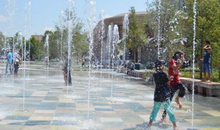
Productivity losses could reduce GDP by 1.3% as a result of extreme heat
2025-07-02 13:21:04
He abused his minor daughter, Zamir Meta is left in prison
2025-07-02 13:04:04

Waste burning in Elbasan, Alizoti: They are poisoning people and stealing money
2025-07-02 12:48:39
Civil disobedience continues in Serbia, dozens of people detained
2025-07-02 12:40:32
Rama's government was born under the sign of garbage and will end like this
2025-07-02 12:28:09
Water prices increase in the municipalities of the Elbasan region
2025-07-02 12:13:38
Civil disobedience continues in Serbia, what is happening in Belgrade?
2025-07-02 12:07:44
Serious accident in Thumanë, one dead, 3 injured
2025-07-02 11:54:42
Durrës Court suspends the director of Pre-University Education from duty
2025-07-02 11:49:27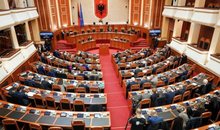
Plenary session on Thursday, what is expected to be discussed
2025-07-02 11:36:43
Europe is burning from heat waves/ What is the 'thermal dome' phenomenon?
2025-07-02 11:26:25
Wanted by Italy for murder, 45-year-old arrested in Vlora
2025-07-02 11:19:31
Fire situation, 28 fires reported in 24 hours, 2 still active
2025-07-02 11:13:20
"Buka" file, preliminary hearing for Ahmetaj postponed to July 17
2025-07-02 11:03:30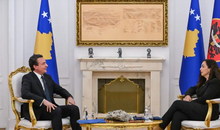


Baçi: Belinda Balluku and Ceno Klosi, the most dangerous "gangs" in Fier
2025-07-02 10:32:09
Zamir Meta, suspected of sexually abusing his daughter, arrives in court
2025-07-02 10:21:33

Trump: Israel has agreed to a 60-day ceasefire in Gaza
2025-07-02 10:01:55
Fire continues at Elbasan landfill
2025-07-02 09:51:13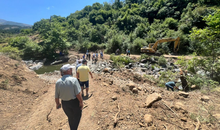

Dates to note during July, important events will occur
2025-07-02 09:31:45
The hearing for Jorgo Goro's claim is postponed
2025-07-02 09:24:19



Foreign exchange, the rate at which foreign currencies are sold and bought
2025-07-02 08:42:31

52% of pensioners did not receive full pension in 2024
2025-07-02 08:27:18
Horoscope, what do the stars have in store for you today?
2025-07-02 08:13:36
Hot weather, Wednesday brings high temperatures
2025-07-02 07:59:16
Morning Post/ In 2 lines: What mattered yesterday in Albania
2025-07-02 07:46:15
Heatwave sweeps across Europe, Spain and England record hottest June ever
2025-07-01 22:57:41






Golem and Qerret without water at the peak of the tourist season
2025-07-01 21:09:32

Euractiv: Italy-Albania migrant deal faces biggest legal challenge yet
2025-07-01 20:53:38
BIRN: Brataj and Fevziu victims of a 'deepfake' on Facebook
2025-07-01 20:44:00

Vlora by-pass, work delays and cost increases
2025-07-01 20:24:29



Milan are expected to give up on the transfer of Granit Xhaka
2025-07-01 19:41:25

